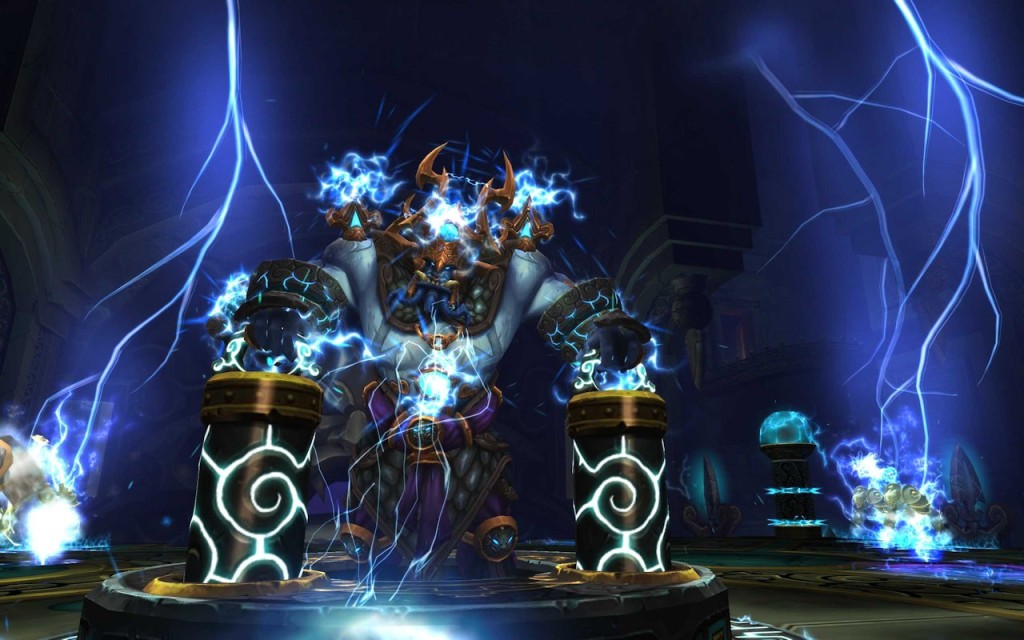Wow, have I been playing a LOT of World of WarCraft! I’ve been playing it near religiously for the past couple weeks, mostly eschewing all other games. Summer does this at times; so does joining a raiding guild. But it certainly doesn’t explain why I am trying to gear up several characters at the same time like a madman. Yes, even daily quests.

I’m not sure why, but my playing goes through stages. Sometimes, World of WarCraft creates the dreaded sting of inevitability – it becomes an obligation and a chore to cap out all your Valor points for the week. No one enjoys playing at that time, and you find people quite irritated at the notion that “Blizzard makes me do this” when in fact we force the grind on ourselves out of some misguided notion that we must maximize our time every month. It’s fifteen dollars of quality entertainment (and possibly displays of skill, if you’re lucky), but sucking the fun out of it isn’t hard at all. World of WarCraft IS an MMO, after all, and a product designed to take your money.
However, sometimes the game just clicks and you find yourself motivated to play purely out of fun and delight. That’s the case for me right about now, and I LOVE this mood. You usually achieve a lot in this time frame, to the point where I develop three characters every week without even breaking a sweat. “Real life”, as you might call it, also becomes more efficient for whatever reason. It’s an odd phenomenon; when I play video games well, things also go well in other areas. I even record podcasts, write multiple articles a day, and fix loads of other problems at the same time. Maybe a few debates get thrown into the mix. Maybe it’s just the coffee!
Or maybe it’s Toroenfuego, the first character in WoW that completely clicked a magical switch in my brain. At heart, though I wear my academic pretensions, I am a lunkhead who likes hitting stuff hard with big weapons. Must be something about being male, but the Warrior class has this in spades. Who doesn’t like holding onto a giant sword, or maybe even a shield, and just smacking things? That doesn’t mean the game does not require skill, but WoW involves some notion of aesthetic pleasure to it. After all, why keep getting gear if it doesn’t look cool, right? As you can see from this gigantic chart of all the coolest Warrior sets, they make you look like a man covering in plate mail (with a gigantic sword and/or shield to match). Hard to beat that, I say.
Anyway, the point is, other than my weird fetish for digital plate mail, is that there are times where I feel motivated and raring to go; other times, you do not want to work at anything at all. Anyone and everyone has these mood swings, as I’d call them, and they’re inescapable changes in the way we do business. Perhaps there’s a scientific reason for these constant shifts, and perhaps not. Sometimes they’re attributable to exterior circumstances, and sometimes to no reason at all, but they do happen to the best and the worst of us with unerring consistency.
We cannot always remain in this hyper-aware state of efficiency. Everyone comes down sometime, and everyone needs some rest and relaxation. You don’t need to go on a cruise to relax, of course; it could manifest in something as simple as solitaire, really. Recreation, for whatever reason, often involves things we enjoy. Apparently, I talk about recreation a lot if you take the common line about video games, but video games vary between challenging and relaxing. I’ve fallen asleep playing some RPGs, and some games aren’t a good idea for a late-night session (see: bullet hell shooters, Lei Shen in WoW’s latest raid with twenty-four strangers).

I tend, on this blog, to make myself sound like the man without feelings and moods, but that’s simply not true. What I do, instead, does not rely on the shifting tone and mood of myself. Rather, it deals with truth and its concequences as per the Bible. What God’s Word says does not depend on how I feel at a particular moment, or even how I think. Rather, what it does (if read in the right way) is order our thinking, and subsequently our feelings, in the right light. As James 1 says:
17 Every good thing given and every perfect gift is from above, coming down from the Father of lights, with whom there is no variation or shifting shadow.18 In the exercise of His will He brought us forth by the word of truth, so that we would be a kind of first fruits among His creatures.
God does not experience change, variation, and shifting shadow. Yes, God “changes” His mind throughout Scripture, but in the very same chapters (and sometimes verses) it says He does not change His mind at all. Should we try to be like God in this capacity? Absolutely not, for the simple reason that we were not created to exist like that. We exist for community, for glorification, and for relationships, not to displace ourselves from the rest of society and look down at stuff.
At the same time, we’re called by the Great Comission to preach the Gospel to all nations. In fact, thinking about our limited time span on Earth, what should we spend it doing? Wasting our times as our whims demands, or dedicating that time to the Creator of the universe? Yet, we find Jesus basically relaxing and being a normal human being for thirty years. What did He do in that time? Well, live a normal life, actually! Jesus, the Son of God, became a carpenter by trade and only preached for a period of, what, three years? Why does the Lord of the universe take His time so often if things feel so urgent in the dissemination of the Gospel? Surely, Paul’s calls for preaching vigorously until the (not) end of time exist for a reason? Why are we still here two thousand years later, then?
Or, to pose a question, should we be efficient workers of the Gospel, or relax at all while work exists still in spreading it?
It’s strange to say, but I wager that there’s a time for everything. Plenty of people throughout the Christian Church turned into passionate believers…and then went about living normal lives. It’s a strange conundrum, one made rather relevant to me. I am doing what I enjoy right now – what, exactly, becomes my recreation in that case? Every decision should feel monumental, given this eternal perspective, yet we often act like it doesn’t.
And perhaps it does not, I’m not sure. I look to the Christians of the past, and they did appear to wrestle much with such questions at all. Rather, all our innocuous decision making shows an expression of our free will. Whether efficient (from a wordly perspective, of course) or “slacking off”, people lived their lives within their cultural context as Christians. That was that. Did they seek to change things? Absolutely, and for the better – seriously, just look at pre/post Christian Roman Empire. Look at the supposed “Dark Ages” of Europe, where people had a shorter work-week and more recreation time than anyone in the “modern”, “civilized” world. Christianity had nothing to do with that, I bet. And they even made more money and had more disposable income than most third world nations today, as well as plenty of time to make beer (I guess they found an interesting hobby).
It’s hard to argue with Ecclesiastes 3 on this point – add all the stuff up, try to work yourself to death for Christ, and you’ll end up in the hole (the one with graves):
24 There is nothing better for a man than to eat and drink and tell himself that his labor is good. This also I have seen that it is from the hand of God. 25 For who can eat and who can have enjoyment without Him? 26 For to a person who is good in His sight He has given wisdom and knowledge and joy, while to the sinner He has given the task of gathering and collecting so that he may give to one who is good in God’s sight. This too is vanity and striving after wind.
Not everyone receives that opportunity to do whatever they want, server wherever they will, and do what they wish for God. Everyone’s got different constraints. For us Americans, we have what I’d call ‘first world problems” – specifically, the ability to completely over-think elements of society which were once givens, neither good nor bad but right in their place. That’s our problem now: to think that our intellectual musings will somehow change everything through some process of osmosis. It just doesn’t work that way.
It’s almost like elitist bullying at times. “How could he not realize the inherent sinfulness of allowing for sexism/feminism/racism?”, etc. Simplicity works as the best policy. Notice that Jesus never bullies the down-and-out, the common man – He’s always hashing it out with religious leaders, the intellectuals of that day, who call people out on their multifarious wrongdoings. Pharisees in the Bible direct their private worries outward to avoid dealing with themselves. I imagine you might be seeing the point of this long, slipshod essay at last.
All of our actions retain eternal significance – but that doesn’t mean every action must carry the notion of false sentimentality, false efficiency, and false piety for the Christian faith. To realize our overall insignificance in the grand scheme does lighten your burden a little, does it not? Yet that does not mean our actions do not carry some import of our life, or even what games we play. Maybe my WoW addiction (I mean, regulated habit of great enjoyment) actually means something. Perhaps your weird characteristics mean something.
The life of that guy down the street who just goes to church and doesn’t question these things might seem like a boor, a buffoon, a man unwilling to ask the hard questions. Maybe, though, he just got it right. Perhaps our educations make us so blind to a simple Christian “walk”. We are God’s children, and we want to grow up too fast; what a pity, but a correctable mistake. Chesteron’s Father Brown character puts it in plainer language:
‘Do you believe in doom?’ asked the restless Prince Saradine suddenly.
‘No,’ answered his guest. ‘I believe in Doomsday.’
The prince turned from the window and stared at him in a singular manner, his face in shadow against the sunset. ‘What do you mean?’ he asked.
‘I mean that we here are on the wrong side of the tapestry,’ answered Father Brown. ‘The things that happen here do not seem to mean anything; they mean something somewhere else. Somewhere else retribution will come on the real offender. Here it often seems to fall on the wrong person.’
What about World of WarCraft? It was a vehicle to prove a point. So there’s your anti-climax.
